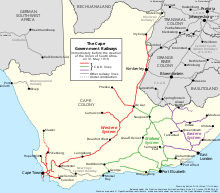| Revision as of 20:35, 8 December 2024 editDerek Andrews (talk | contribs)Extended confirmed users13,822 edits Adding short description: "Defunct railway company in South Africa"Tag: Shortdesc helper← Previous edit | Revision as of 07:24, 9 December 2024 edit undoCAPTAIN RAJU (talk | contribs)Extended confirmed users, Page movers, New page reviewers, Pending changes reviewers, Rollbackers409,739 editsm →History: clean up, typo(s) fixed: 40 mile → 40-mileTag: AWBNext edit → | ||
| Line 7: | Line 7: | ||
| Construction of the first part of the line of the Cape Central Railway from Worcester was paid for by a combination of share capital and a subsidy from the Colonial Government of £50,000. It opened to Robertson in January 1887 and to Ashton in October of the same year. It very quickly ran into financial difficulties and went bankrupt around 1889. The ] was Sir ] and in August 1892 was sold to the New Cape Central Railway which was registered in England in 1893. By 1896 the railway had gross earnings of £15,815 and net earnings of £6,294.<ref name="rt72">{{cite journal |title=The New Cape Central Railway Ltd |journal=Railway Times |date=July 3, 1897 |volume=72 |page=32 |url=https://books.google.ca/books?id=TRBCAQAAIAAJ&pg=PA32 |access-date=7 December 2024 |language=en}}</ref> | Construction of the first part of the line of the Cape Central Railway from Worcester was paid for by a combination of share capital and a subsidy from the Colonial Government of £50,000. It opened to Robertson in January 1887 and to Ashton in October of the same year. It very quickly ran into financial difficulties and went bankrupt around 1889. The ] was Sir ] and in August 1892 was sold to the New Cape Central Railway which was registered in England in 1893. By 1896 the railway had gross earnings of £15,815 and net earnings of £6,294.<ref name="rt72">{{cite journal |title=The New Cape Central Railway Ltd |journal=Railway Times |date=July 3, 1897 |volume=72 |page=32 |url=https://books.google.ca/books?id=TRBCAQAAIAAJ&pg=PA32 |access-date=7 December 2024 |language=en}}</ref> | ||
| A 40 |
A 40-mile extension of the line to Swellendham was funded by mortgage debentures, share capital and a further subsidy by the Colonial Government at £1,500 per mile.<ref name="rt72" /> It opened on 12 April 1899. ] of 1901 reported that the line was complete to Riversdale, but not yet working, and noted that construction was rapid compared to State-managed railways.<ref name="rm9">{{cite journal |title=Railway Development in South Africa |journal=] |date=1901 |volume=9 |page=218 |url=https://books.google.ca/books?id=qY5IAAAAYAAJ&pg=PA218 |access-date=7 December 2024 |publisher=IPC Magazines |language=en}}</ref> In 1902, Parliament agreed to subsidize the final 57 mile section to Mossel Bay at the rate of £2,000 per mile.<ref name="GBCO">{{cite book |last1=Great Britain Colonial Office |title=The Colonial Office List for 1905 |date=1905 |publisher=Harrison |page=134 |url=https://books.google.ca/books?id=yGdPAAAAMAAJ&pg=PA134 |access-date=7 December 2024 |language=en}}</ref> It opened on 22 Jan 1906. | ||
| The company was purchased by South African Railways for £1,100,000 on 1 August 1925.<ref name="ra78" /> |
The company was purchased by South African Railways for £1,100,000 on 1 August 1925.<ref name="ra78" /> | ||
| In 2023 a tourist steam train began operating out of Robertson station under the name New Cape Central Railway.<ref name="n24">{{cite news |last1=Jantjies |first1=Tamsyn |title=Steam through the Langeberg |url=https://www.news24.com/news24/community-newspaper/worcesterstandard/steam-through-the-langeberg-20230913 |access-date=8 December 2024 |work=] |date=14 Sep 2023}}</ref> | In 2023 a tourist steam train began operating out of Robertson station under the name New Cape Central Railway.<ref name="n24">{{cite news |last1=Jantjies |first1=Tamsyn |title=Steam through the Langeberg |url=https://www.news24.com/news24/community-newspaper/worcesterstandard/steam-through-the-langeberg-20230913 |access-date=8 December 2024 |work=] |date=14 Sep 2023}}</ref> | ||
Revision as of 07:24, 9 December 2024
Defunct railway company in South AfricaThe Cape Central Railway, later known as the New Cape Central Railway, was a railway in the Cape Colony, now part of South Africa. It linked the Cape Government Railways at Worcester, first to Ashton, then extended to Swellendam and eventually to Mossel Bay. This privately owned line of 205 miles was bought by South African Railways in 1925.

History
Construction of the first part of the line of the Cape Central Railway from Worcester was paid for by a combination of share capital and a subsidy from the Colonial Government of £50,000. It opened to Robertson in January 1887 and to Ashton in October of the same year. It very quickly ran into financial difficulties and went bankrupt around 1889. The liqidator was Sir Thomas Charles Scanlen and in August 1892 was sold to the New Cape Central Railway which was registered in England in 1893. By 1896 the railway had gross earnings of £15,815 and net earnings of £6,294.
A 40-mile extension of the line to Swellendham was funded by mortgage debentures, share capital and a further subsidy by the Colonial Government at £1,500 per mile. It opened on 12 April 1899. The Railway Magazine of 1901 reported that the line was complete to Riversdale, but not yet working, and noted that construction was rapid compared to State-managed railways. In 1902, Parliament agreed to subsidize the final 57 mile section to Mossel Bay at the rate of £2,000 per mile. It opened on 22 Jan 1906.
The company was purchased by South African Railways for £1,100,000 on 1 August 1925.
In 2023 a tourist steam train began operating out of Robertson station under the name New Cape Central Railway.
References
- ^ "Agreement for State Purchase of the South African Private Line". Railway Age. 78. Simmons-Boardman Publishing Company: 1492. 1925. Retrieved 7 December 2024.
- ^ "The New Cape Central Railway Ltd". Railway Times. 72: 32. July 3, 1897. Retrieved 7 December 2024.
- "Railway Development in South Africa". The Railway Magazine. 9. IPC Magazines: 218. 1901. Retrieved 7 December 2024.
- Great Britain Colonial Office (1905). The Colonial Office List for 1905. Harrison. p. 134. Retrieved 7 December 2024.
- Jantjies, Tamsyn (14 Sep 2023). "Steam through the Langeberg". News24. Retrieved 8 December 2024.
External links
- New Cape Central Railway (PTY) Ltd Tourist steam train
Further reading
- Rhind, D. M. (1995). A Chronicle of the Cape Central Railway. Railway History Group. ISBN 978-0-9584009-1-6.
- Lewis, C.P. "Soul of A Railway - Part 12: Worcester-Mossel Bay and the NCCR". sites.google.com. Retrieved 7 December 2024.